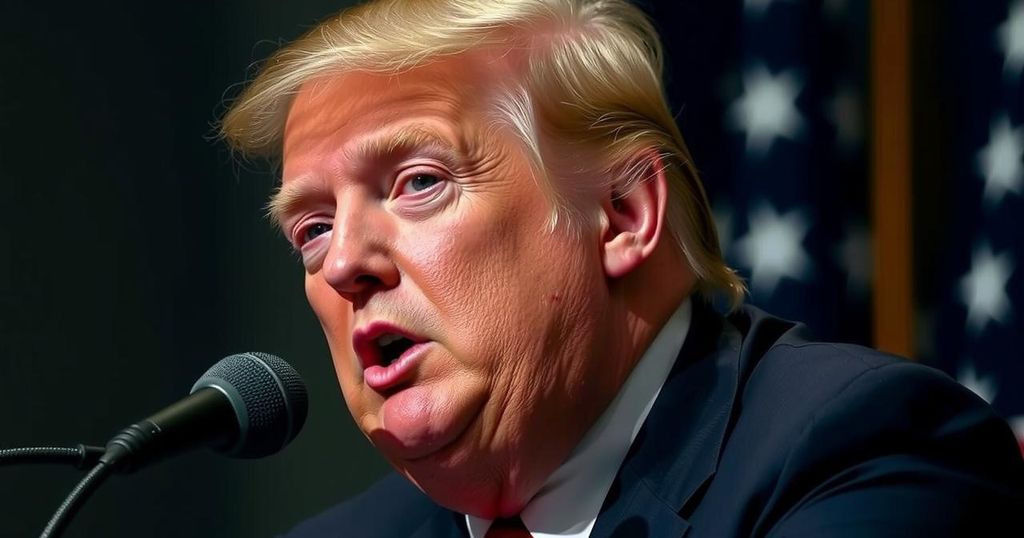Donald Trump Declares U.S. a “Third World Nation” Over Election Concerns
Donald Trump has criticized the integrity of U.S. elections, describing the country as a “third world nation” due to alleged election misconduct. His remarks come as he navigates legal challenges related to election interference, while also opposing a Virginia judge’s decision to halt a voter roll purge. Trump has vowed to scrutinize the upcoming 2024 Presidential Election and prosecute any involved in election-related cheating. Early voting data suggests varied trends among party supporters, which could shape the election outcome.
In a recent statement on Truth Social, former President Donald Trump characterized the United States as a “third world nation” due to what he perceives as rampant election “skullduggery,” particularly in relation to the 2020 Presidential Election. Trump expressed his concerns regarding the integrity of the upcoming 2024 Election, asserting that he, along with numerous attorneys and legal scholars, will scrutinize the proceedings closely. He maintained that there was extensive cheating and misconduct by Democrats in the last election, claims that have consistently been countered by a lack of evidence. Trump continues to navigate two ongoing criminal cases wherein he faces accusations of attempting to interfere with the election process and exerting pressure on former Vice President Mike Pence, as well as various state officials, to overturn the results of the 2020 election. Despite these allegations, he asserts that he is the target of a political witch hunt. His Truth Social remarks further included warnings that all parties involved in any election-related wrongdoing—including lawyers, political operatives, donors, illegal voters, and corrupt election officials—will face severe legal repercussions, potentially leading to lengthy prison sentences. The former president’s frustration was also directed at U.S. District Judge Patricia Tolliver Giles, who recently halted Virginia’s initiative to purge voter rolls of suspected noncitizens. Trump criticized this decision, labeling it “totally unacceptable.” This ruling came after the U.S. Department of Justice raised concerns regarding the legality of the purge, asserting that it violated the National Voter Registration Act by attempting to remove registered voters less than 90 days before a federal election. While fewer than 1,600 registered voters were purged from the rolls based on suspect DMV data, Judge Giles ruled that there was no proof those voters were noncitizens. In light of this ruling, Trump admonished Virginians to continue voting early and expressed his intention to support Governor Glenn Youngkin’s appeal against what he perceives to be an illegal order by the judiciary. Despite Trump’s longstanding claims regarding early voter fraud, evidence indicates that early voting data reflects higher turnout among registered Democrats, although recent trends show an increase in Republican early voters in various swing states. As the landscape of early voting evolves, it remains uncertain what impact this may have on the overall election results.
The statements made by former President Donald Trump illustrate ongoing tensions within the U.S. political landscape, particularly concerning the integrity of elections. Trump’s allegations of misconduct and fraud related to the 2020 Presidential Election have been a continuous theme in his narrative, despite numerous investigations and lack of evidence substantiating these claims. His comments regarding the upcoming 2024 Election also reflect a broader Republican strategy that emphasizes voter integrity, often framing Democratic election practices as corrupt. The legal challenges he faces amplify his assertions of a political witch hunt, intertwining his electoral ambitions with his legal battles. Furthermore, the debate surrounding voter rolls, particularly in Virginia, highlights the contentious nature of voting rights and election integrity in the U.S., with local and federal entities often at odds about what constitutes lawful election practices. The impact of early voting trends, particularly on party mobilization, remains a focal point as the 2024 Presidential Election approaches.
In summary, former President Donald Trump’s recent comments labeling the U.S. as a “third world nation” over electoral issues underscore his persistent narrative surrounding election integrity and alleged misconduct by Democrats. His call for rigorous scrutiny of the upcoming 2024 election, accompanied by threats of legal action against those he accuses of wrongdoing, illustrates the intertwining of his legal troubles with his political ambitions. Furthermore, the looming legal battles surrounding voter roll purges in Virginia serve to heighten the ongoing discourse over election laws and practices in the United States, fostering a contentious environment leading up to the election.
Original Source: www.newsweek.com




Post Comment